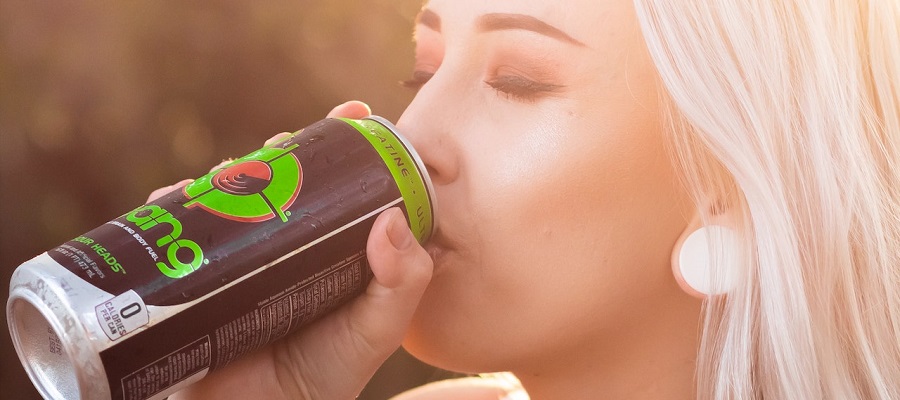Energy drinks are beverages that are designed to boost energy and alertness. They typically contain caffeine, as well as other ingredients such as taurine, guarana, and B-vitamins. Some energy drinks also contain sugar or sweeteners, as well as other herbs and nutrients that are claimed to have energizing properties. Energy drinks are usually consumed for their stimulant effects, which can help to improve focus, alertness, and physical performance. They are often marketed to people who are looking for a quick and easy way to increase their energy levels, such as athletes, students, and people who work long hours or have demanding schedules. However, it is important to note that energy drinks can have negative side effects, such as jitters, insomnia, and increased heart rate, and they should be consumed in moderation.
How healthy are energy drinks?
Energy drinks can be consumed in moderation as part of a healthy lifestyle. However, it is important to be aware of the potential negative effects of energy drinks.
Caffeine, which is a common ingredient in energy drinks, can be safe and beneficial when consumed in moderation, but consuming too much caffeine can cause negative side effects such as jitters, insomnia, and an increased heart rate. The American Academy of Pediatrics recommends that children and adolescents limit their caffeine intake to no more than 100 mg per day, which is equivalent to about one 8-ounce cup of coffee. For adults, the recommended daily limit is 400 mg, which is equivalent to about four 8-ounce cups of coffee. It is important to note that the caffeine content of energy drinks can vary widely, and some energy drinks contain much more caffeine than a cup of coffee.
In addition to caffeine, energy drinks often contain other ingredients such as taurine, guarana, and B-vitamins, which are claimed to have energizing properties. However, the safety and effectiveness of these ingredients is not well-established, and more research is needed to determine their potential benefits and risks.
Energy drinks can also contain high amounts of sugar, which can contribute to weight gain and other health problems if consumed in excess. It is important to read the label and choose energy drinks that are low in sugar or that use low-calorie sweeteners.
Overall, it is important to consume energy drinks in moderation and to be aware of their potential negative effects on your health. It is also important to be aware of the potential interactions between energy drinks and other medications or substances, and to talk to a healthcare provider if you have any concerns.
How much caffeine does a regular energy drink contain?
The amount of caffeine in an energy drink can vary widely depending on the brand and size of the drink. According to the Centers for Disease Control and Prevention (CDC), the caffeine content of energy drinks can range from about 50 mg to more than 500 mg per serving.
In general, a regular-sized energy drink (8 ounces or 240 milliliters) can contain anywhere from about 50 mg to 200 mg of caffeine. Some energy drinks contain much more caffeine than this, with some brands offering 16-ounce or 24-ounce servings that contain as much as 300 mg or more of caffeine. It is important to read the label and be aware of the caffeine content of the energy drink you are consuming.
It is also important to note that the caffeine content of energy drinks can vary depending on the specific product and the ingredients it contains. Some energy drinks contain caffeine from multiple sources, such as caffeine anhydrous (a pure form of caffeine) and caffeine from natural sources like guarana or green tea extract. This can make it difficult to determine the exact caffeine content of an energy drink.
It is generally recommended to consume energy drinks in moderation, and to be aware of the potential negative effects of caffeine on your health. The American Academy of Pediatrics recommends that children and adolescents limit their caffeine intake to no more than 100 mg per day, while the recommended daily limit for adults is 400 mg.
Which are the most famous energy drink brands?
There are many different brands of energy drinks available on the market. Some of the most well-known and widely available brands include:
-
Red Bull: Red Bull is one of the most popular and well-known energy drink brands. It is available in many countries around the world and is known for its iconic blue and silver can. Red Bull contains caffeine, taurine, B-vitamins, and sugars or sweeteners.
-
Monster: Monster is another well-known energy drink brand that is available in a variety of flavors. It contains caffeine, taurine, guarana, and B-vitamins, as well as sugars or sweeteners.
-
Rockstar: Rockstar is a popular energy drink brand that is available in a variety of flavors. It contains caffeine, taurine, guarana, and B-vitamins, as well as sugars or sweeteners.
-
NOS: NOS is an energy drink brand that is known for its high caffeine content. It contains caffeine, taurine, guarana, and B-vitamins, as well as sugars or sweeteners.
-
5-Hour Energy: 5-Hour Energy is a popular energy drink brand that is known for its small size and high caffeine content. It contains caffeine, taurine, and B-vitamins, as well as other ingredients that are claimed to have energizing properties.
It is important to note that the ingredients and caffeine content of energy drinks can vary depending on the specific product and brand. It is generally recommended to consume energy drinks in moderation and to be aware of the potential negative effects of caffeine on your health.
Who should avoid drinking energy drinks?
There are certain groups of people who may want to avoid energy drinks or consume them with caution due to the potential negative effects of caffeine and other ingredients. These groups include:
-
Children and adolescents: The American Academy of Pediatrics recommends that children and adolescents limit their caffeine intake to no more than 100 mg per day, which is equivalent to about one 8-ounce cup of coffee. Energy drinks often contain much more caffeine than this, and they may not be suitable for children and adolescents.
-
Pregnant or breastfeeding women: Caffeine is a stimulant that can cross the placenta and enter the fetus. While moderate caffeine intake is generally considered safe during pregnancy, it is recommended that pregnant women limit their caffeine intake to 200 mg or less per day. It is also recommended that breastfeeding women limit their caffeine intake to 300 mg or less per day.
-
People with caffeine sensitivity: Some people may be more sensitive to caffeine and may experience negative side effects such as jitters, insomnia, and an increased heart rate after consuming even small amounts of caffeine. These individuals may want to avoid energy drinks or consume them with caution.
-
People taking certain medications: Energy drinks can interact with certain medications and may cause negative side effects. For example, caffeine can increase the blood pressure-lowering effects of certain medications, and it can interfere with the effectiveness of certain headache medications. If you are taking any medications, it is important to talk to your healthcare provider before consuming energy drinks.
-
People with certain medical conditions: Energy drinks may not be suitable for people with certain medical conditions, such as heart disease, high blood pressure, or diabetes. If you have any concerns about the safety of energy drinks, it is important to talk to your healthcare provider.
It is generally recommended to consume energy drinks in moderation and to be aware of the potential negative effects of caffeine and other ingredients on your health. If you have any concerns about the safety of energy drinks, it is important to talk to your healthcare provider.
What happens if I drink energy drinks everyday?
Drinking energy drinks on a daily basis can have negative effects on your health. Caffeine, which is a common ingredient in energy drinks, is a stimulant that can have a range of effects on the body. Consuming too much caffeine can cause negative side effects such as jitters, insomnia, and an increased heart rate. It can also interfere with your body's ability to absorb certain minerals, such as calcium and iron.
In addition to caffeine, energy drinks often contain other ingredients such as taurine, guarana, and B-vitamins, which are claimed to have energizing properties. However, the safety and effectiveness of these ingredients is not well-established, and more research is needed to determine their potential benefits and risks.
Energy drinks can also contain high amounts of sugar, which can contribute to weight gain and other health problems if consumed in excess. Consuming energy drinks on a daily basis can increase your risk of developing health problems such as obesity, type 2 diabetes, and dental problems.
It is generally recommended to consume energy drinks in moderation and to be aware of the potential negative effects of caffeine and other ingredients on your health. The American Academy of Pediatrics recommends that children and adolescents limit their caffeine intake to no more than 100 mg per day, while the recommended daily limit for adults is 400 mg. If you have any concerns about the safety of energy drinks, it is important to talk to your healthcare provider.


